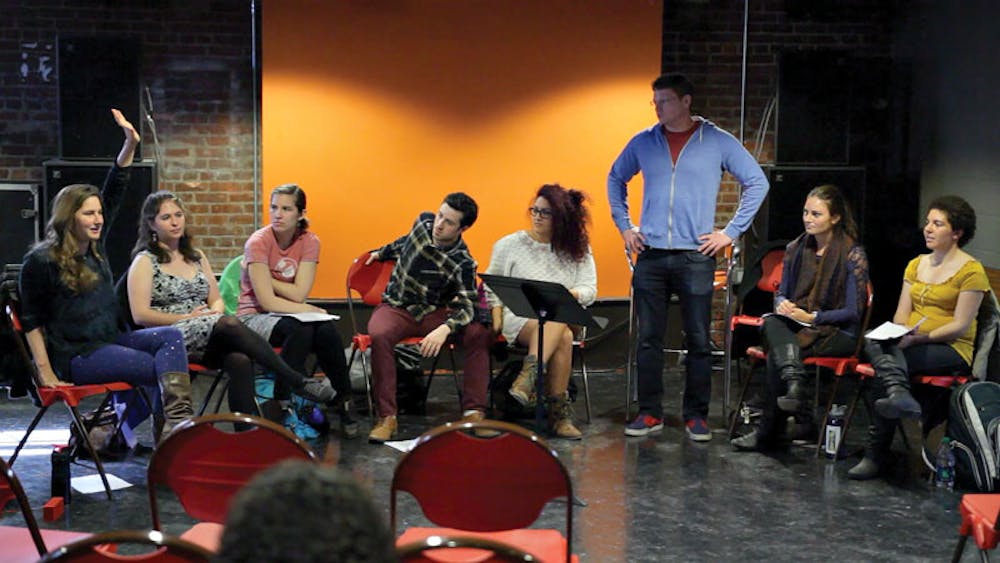In the world of food, there can sometimes be three stereotypical types of eaters: those with eating disorders, those with a healthy relationship with food and those who are male. Yet these divisions are anything but precise, and among them lie numerous gray areas yet to be addressed, as shown in “The Secret Life of Eating at Brown.”
This production, written and directed by Phoebe Nir ’14 and performed this weekend, aimed to clarify this obscure middle ground of disordered eating, particularly on campus. Nir said she crafted the script as a compilation of responses to an anonymous survey she sent out in early March through Morning Mail. The survey asked students questions about their relationships with food and eating disorders and how these affected their lives at Brown. The questions covered eating experiences and perceived relationships with food, including whether there were situations when food caused an individual anxiety or the frequency with which the respondent thought about food.
For Nir, the play provided the ideal forum to call attention to this gray area of disordered eating that is often not adequately addressed by society, but nevertheless is highly prevalent. “I felt like there wasn’t enough conversation surrounding that issue,” she said.
During the performance, students sat in a semicircle, taking turns reading monologues selected from the survey responses or created by synthesizing multiple responses. In between the monologues, actors rattled off questions similar to those in the survey, providing the performance with momentum and contextualizing the monologues.
Nir wanted to shed light on society’s definition of eating disorders and disordered eating, which she said tends to be qualified by extreme images of emaciated bodies and mentally tortured women. While these severe cases exist, many people who suffer from these conditions “don’t fit into those very narrow categories,” she said. “As a result, a lot of people stay quiet.”
Nir said her own struggle with disordered eating motivated her to send out the survey. She suffered from anorexia in high school, but has since recovered, she said. Though her eating disorder was not visibly reflected in her figure, she said she was still internally battling with her relationship with food in college.
“I felt that I wasn’t really diagnosable in any sort of specific way, but at the same time I felt like I was really struggling,” she said. “You’re in some sort of weird middle ground that’s not clinically diagnosable, but there’s definitely an issue.”
“It definitely made me feel less alone in a lot of ways,” said Nika Salazar ’16, who performed in the play. “I think that, just in my experience, a lot people at Brown struggle with food and their view of food.”
Eating in high school was regulated by a set lunch time and dinner with the family, she said, but in college, the freedom with food can be overwhelming.“With that power, things can get a little bit out of control,” she explained.
Rather than writing a creative piece or staging a one-woman show, Nir said she wanted the script to be organically sourced from the student body. “I don’t think it would be of the most value to my community for the play to be about my amazing recovery and self-discovery,” she said. “The play wasn’t about solving problems or putting forward a solution of ‘this is what it looks like to have a healthy relationship with food.’ It was just about ‘okay, what’s going on?’”
The definition of disordered eating was a vital message of the play. “It’s an internal experience,” Nir said. “Even if you’re eating a perfectly healthy diet, if you feel like you’re feeling a lot (of) stress and unhappy, then you can have an eating disorder.”
People’s feelings about food vary “at different points in their lives and different points the day,” said Gabriela Gutierrez ’14, a performer, adding that individuals’ relationships with food can be confusing.
Students who attended “The Secret Life of Eating at Brown” expressed an interest in discussing issues of disordered eating among their peers.
“I was really excited to see it because I did think that it addressed something on campus, a conversation that people weren’t having, which is exactly what Phoebe noticed,” Zoey Downes ’14 said.
Jonathan White ’15 said he perceived the show as an opportunity to view a different perspective. “While I haven’t been personally affected by (an eating disorder), a family member of mine has, and it’s something you don’t really talk about that often and I never asked about either,” he said. “It was just nice to hear other people’s experience and to try and understand it.”
Caitlin Deal ’14 said she appreciated how the show exposed a clandestine food culture at Brown. “I think a lot of people know it’s a thing that’s more prevalent than reported, but again, we don’t really talk about it.”
The show was a way to raise awareness about the lack of attention Brown gives to eating disorders and other mental health issues, said Emma Blake ’15, one of the performers.
“I think Brown is a really open community in general, especially we’re very progressive as far as sex and other things go,” she said. “But I think as far as eating disorders and other mental health problems, it’s often hard to find the support you need on campus.”

ADVERTISEMENT




